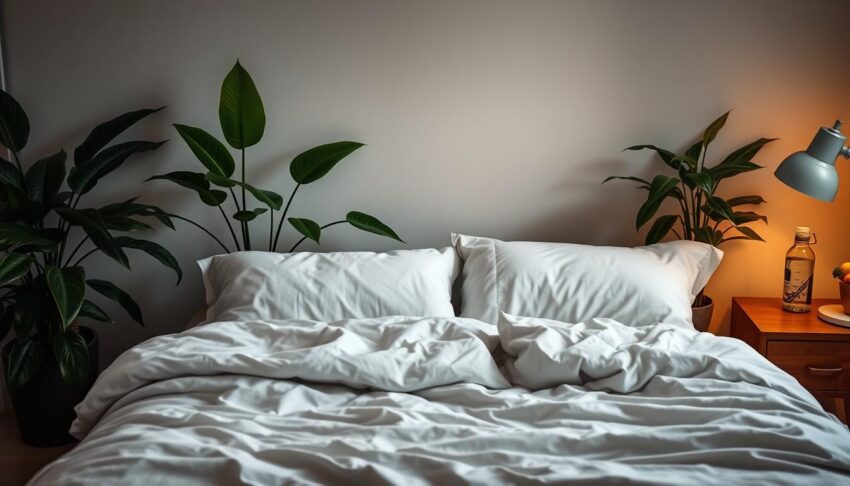I never knew how much sleep could change my health until I tried it. For years, I fought to lose weight and feel more energetic. I looked for the best diet and exercise plans. But the real secret was right under my pillow.
Sleep is more than just a way to rest at night. It’s a key strategy for losing weight and staying healthy. When I started valuing good sleep, my weight loss journey changed. The link between sleep and how our body works is complex.
This journey will show you the science behind #SleepHealth and its big impact on our bodies. Sleep affects how we burn calories and balance hormones. Learning about sleep can change how we think about health and losing weight.
Key Takeaways
- Sleep plays a key role in losing weight and keeping your metabolism healthy
- Good sleep affects your hormones and energy levels
- Improving your sleep can help you reach your weight loss goals
- Sleep is a vital part of staying well, but often overlooked
- Learning about sleep science can change how you approach health
Understanding Sleep and Its Importance for Health
Sleep is a fascinating process that’s key to my health. It’s complex and vital for a healthy life.

Learning about sleep starts with what happens when I sleep. It’s not just rest. It’s active repair for my body and mind.
What Happens During Sleep?
When I sleep, my body changes in amazing ways. These changes are important for staying healthy:
- Cellular repair and regeneration
- Memory consolidation
- Hormone regulation
- Brain detoxification
“Sleep is the golden chain that binds health and our bodies together.” – Thomas Dekker
Stages of Sleep Explained
My sleep cycle has different stages, each with its own role:
- Light Sleep (Stage 1-2): A phase where I’m less aware of my surroundings
- Deep Sleep (Stage 3-4): Important for physical recovery and growth
- REM Sleep: Key for mental processing and emotional balance
Knowing about these stages shows how complex and important sleep is for my health.
The Connection Between Sleep and Weight Loss
Learning about the link between sleep and weight management can change the game for anyone looking for #WeightLossTips. Sleep is more than just rest; it’s key to metabolic health and body shape.

Exploring the science of sleep and weight reveals interesting connections. These insights can change how I view a balanced diet and overall health.
How Sleep Influences Metabolism
My body’s metabolism is like a complex machine, and sleep is essential for it to work right. Deep sleep helps with important metabolic processes that affect weight:
- Hormone regulation for hunger and fullness
- Restoration of energy systems
- Cellular repair and regeneration
“Sleep is the golden chain that binds health and our bodies together.” – Ancient Proverb
The Impact of Sleep on Cravings
Not getting enough sleep can make me want to eat more and choose unhealthy foods. These sleep tips can help control those cravings:
- Maintain a consistent sleep schedule
- Create a relaxing bedtime routine
- Limit caffeine and screen time before bed
By focusing on quality sleep, I can support my weight loss efforts and keep my metabolism healthy.
“Ready for the Change You’ve Been Dreaming Of?”
👉 Learn More Now!
Sleep Deprivation and Its Effects on My Health
Sleep is key to my #SleepHealth, and learning about sleep deprivation’s effects has opened my eyes. Not getting enough sleep isn’t just about feeling tired. It can really hurt my body and mind.

Physical Consequences of Lack of Sleep
When I don’t focus on getting enough sleep, my body pays the price:
- Weakened immune system, making me more susceptible to infections
- Increased risk of cardiovascular diseases
- Higher likelihood of metabolic disorders
- Slower physical recovery and reduced muscle repair
“Sleep is the golden chain that binds health and our bodies together.” – Thomas Dekker
Mental and Emotional Toll of Insufficient Sleep
Sleep deprivation affects more than just my body. It messes with my mind and emotions too:
- Reduced concentration and memory performance
- Heightened stress levels
- Increased risk of mood disorders
- Decreased emotional resilience
Seeing these effects has made me realize how important sleep quality is for my health.
The Science Behind Sleep Quality and Weight Management
Learning about the link between sleep and weight is key for a healthy life. I’ve found that sleep quality affects how our body manages weight and metabolism.

Sleep is vital for keeping our hormones in balance. This balance is important for losing weight and staying healthy. Yet, many #WeightLossTips miss this important sleep and metabolism connection.
The Relationship Between Sleep Quality and Fat Storage
Not getting enough sleep changes how our body works. Bad sleep messes with hormones that control hunger and fat:
- Leptin (satiety hormone) decreases
- Ghrelin (hunger hormone) increases
- Cortisol (stress hormone) becomes elevated
Understanding the Role of Hormones
Hormones play a big role in sleep and metabolism. My studies show how sleep stages affect how our body regulates metabolism:
| Hormone | Sleep Impact | Weight Management Effect |
|---|---|---|
| Leptin | Produced during deep sleep | Reduces appetite |
| Ghrelin | Increases with sleep deprivation | Stimulates hunger |
| Cortisol | Disrupted by poor sleep | Promotes fat storage |
“Sleep is the golden chain that binds health and our bodies together.” – Unknown
By focusing on sleep quality, I’ve found that weight management is more than just diet and exercise. Knowing how hormones work during sleep helps us live healthier and manage weight better.
“Feel Amazing in Just Days—See How!”
👉 Click Here for More Info!
Tips for Improving Sleep Hygiene
Getting quality sleep is vital for our health and happiness. I’ve learned that small changes can greatly improve #SleepHealth. Creating a good sleep environment and sticking to a sleep routine are essential for restful nights.

Creating a Sleep-Conducive Environment
Turning my bedroom into a sleep haven has changed my sleep game. I’ve picked up some great sleep tips, including:
- Maintain room temperature between 60-67°F
- Use blackout curtains to block external light
- Invest in a comfortable mattress and pillows
- Minimize noise with earplugs or white noise machine
“Your bedroom should be a retreat designed for relaxation and rest.” – Sleep Health Expert
Establishing a Consistent Sleep Schedule
Being regular is key to better sleep. I’ve found that a structured sleep routine helps my body know when to relax.
| Time | Sleep Routine Activity |
|---|---|
| 9:00 PM | Begin winding down |
| 9:30 PM | No electronic devices |
| 10:00 PM | Light stretching or reading |
| 10:30 PM | Bedtime |
By following these sleep tips, I’ve seen big improvements in my energy and health. Consistency is the secret to mastering sleep hygiene.
The Role of Nutrition in Sleep Quality
My journey to understand #HealthyLiving showed me how important nutrition is for sleep. Eating right helps me sleep better and manage my weight.
Nutrition affects sleep in ways many don’t see. The foods I eat can either help me sleep well or mess with my #WeightLossTips plans.
Foods to Enhance Sleep Performance
Some nutrients can really help with sleep. Here are some sleep-promoting foods I’ve found:
- Magnesium-rich almonds
- Tryptophan-packed turkey
- Melatonin-containing cherries
- Kiwi fruit for serotonin boost
Foods to Avoid Before Bedtime
Not all foods are good for sleep. Some can really mess with my rest and weight goals:
| Food/Drink | Sleep Disruption Impact |
|---|---|
| Caffeine | Blocks sleep hormones |
| Alcohol | Reduces REM sleep quality |
| Spicy Foods | Increases metabolism, disrupts sleep |
| High-Fat Meals | Slows digestion, causes discomfort |
“What you eat directly influences how you sleep.” – Sleep Nutrition Expert
Choosing the right foods in the evening helps me sleep better. It also supports my health goals.
Exercise and Its Impact on Sleep Patterns
Regular exercise is key to better sleep and a healthy life. I’ve learned that it’s not just about staying fit. It’s also about finding balance for wellness and sleep.
Knowing how exercise affects sleep can change your rest and energy. Not all workouts are good for sleep.
Exercise Types That Promote Better Sleep
- Aerobic exercises like walking, swimming, and cycling
- Strength training with moderate intensity
- Yoga and gentle stretching routines
- Low-impact resistance exercises
Optimal Exercise Timing for Sleep Quality
When you work out can affect your sleep. I found that moderate exercises are best:
- 3-4 hours before bedtime
- Avoid high-intensity workouts before sleep
- Keep a regular exercise schedule
“Movement is a natural sleep enhancer when approached mindfully.” – Sleep Research Institute
Adding regular exercise to my life has greatly improved my sleep. The secret is finding what works for you and sticking to it.
How Sleep Affects My Daily Energy Levels
It’s key to understand how sleep impacts our daily life. My energy and productivity depend on how well I sleep each night.
Sleep is more than just resting. It’s a deep process that refreshes my body and mind. This lets me start each day with energy and focus.
The Link Between Sleep and Productivity
Good sleep boosts my productivity. Studies show that well-rested people:
- Think clearer
- Make decisions faster
- Are more creative
- Solve problems better
“Sleep is the golden chain that binds health and our bodies together.” – Thomas Dekker
Effects of Sleep on Mood and Motivation
My sleep habits affect my mood and motivation. Getting enough sleep improves how I feel and how motivated I am.
| Sleep Duration | Mood Impact | Motivation Level |
|---|---|---|
| Less than 6 hours | Irritable, stressed | Low |
| 7-9 hours | Balanced, positive | High |
By focusing on quality sleep, I can change my daily life. I turn tiredness into lasting energy and excitement.
The Role of Stress Management in Sleep Improvement
Understanding the link between stress and sleep is key to better health. I’ve learned that managing stress is essential for quality sleep and #HealthyLiving.
Stress can mess with our sleep, leading to a cycle of tiredness and worry. By using stress management, I’ve found ways to calm my mind and body for sleep.
Practical Techniques to Reduce Daily Stress
- Practice mindfulness meditation for 10-15 minutes daily
- Engage in deep breathing exercises
- Create a structured evening wind-down routine
- Limit screen time before bedtime
“The quality of your sleep is directly proportional to your ability to manage stress.” – Sleep Wellness Expert
The Transformative Power of Relaxation Techniques
Exploring sleep tips, I found that relaxation techniques are key. Progressive muscle relaxation, guided imagery, and gentle yoga calm my nervous system for rest.
| Relaxation Technique | Stress Reduction Impact | Sleep Improvement Potentia |
|---|---|---|
| Meditation | High | Significant |
| Deep Breathing | Moderate | Substantial |
| Progressive Muscle Relaxation | High | Substantial |
Adding these stress management methods to my routine has greatly improved my sleep and well-being. Finding the right techniques is what makes the journey to better sleep worth it.
Sleep Disorders and Their Impact on Wellness
My journey into understanding #SleepHealth has shown me how vital it is to spot and tackle sleep disorders. These issues can really mess with my wellness and healthy living.
Sleep disorders are not just about having trouble sleeping sometimes. They are serious health problems that can affect my body and mind.
Common Sleep Disorders to Be Aware Of
Knowing about these disorders helps me sleep better and stay healthy. Some common ones are:
- Insomnia: Trouble falling or staying asleep
- Sleep Apnea: Pauses in breathing while sleeping
- Restless Leg Syndrome: Uncomfortable feelings that make you move
- Narcolepsy: Sudden sleep attacks during the day
“Sleep disorders can be silent disruptors of our overall health and well-being.” – Sleep Research Institute
When to Seek Professional Help
I know that if sleep problems keep happening, I need to see a doctor. Signs to watch for include:
- Always having trouble falling asleep
- Waking up a lot at night
- Feeling very tired during the day
- Snoring or gasping a lot while sleeping
Seeing a sleep specialist can help figure out what’s wrong and find the right treatment.
Measuring the Quality of My Sleep
Tracking sleep is key in my #SleepHealth journey. It helps me understand my sleep patterns better. This knowledge aids in improving my wellness and energy.
Today’s technology gives us deep insights into our sleep. With advanced tracking tools, I can learn more about my sleep quality. This knowledge helps me make better choices for my health.
Advanced Sleep Tracking Tools
- Smartphone sleep tracking apps
- Wearable fitness devices
- Non-contact bedroom sensors
- Smart mattress technology
Key Sleep Metrics to Monitor
| Metric | What It Reveals | Improvement Strategy |
|---|---|---|
| Sleep Duration | Total hours of sleep | Aim for 7-9 hours nightly |
| Sleep Efficiency | Time spent actually sleeping | Target 85% or higher |
| REM Cycles | Quality of deep sleep | Optimize sleep environment |
Interpreting Sleep Data for Better Health
Turning sleep data into useful tips requires careful analysis. I look for patterns that affect my daily life and health.
“Knowledge about my sleep is power to improve sleep quality” – Sleep Research Insights
By tracking and analyzing my sleep, I make lifestyle changes. These changes help me sleep better and more efficiently.
The Long-Term Benefits of Prioritizing Sleep
My journey toward #HealthyLiving has shown me that sleep is key. It’s not just a nightly routine. It’s a vital part of staying healthy, affecting both body and mind.
By learning how quality sleep boosts well-being, I see rest as a strong defense. It helps me stay healthy in the long run.
Sleep’s Role in Chronic Disease Prevention
Good sleep cuts down the risk of chronic diseases. Studies show it helps control metabolism, boosts the immune system, and lowers inflammation. For me, sleep is as vital as eating right and exercising.
Embracing a Holistic Approach to Health and Wellness
Adding sleep to my wellness plan shows its link to diet, exercise, and stress. Eating well helps me sleep better, and regular sleep boosts metabolism. Seeing sleep as a health cornerstone helps me stay well for life.
My focus on sleep has changed how I view health. Mindful choices and a holistic view build my strength and well-being for the long haul.


